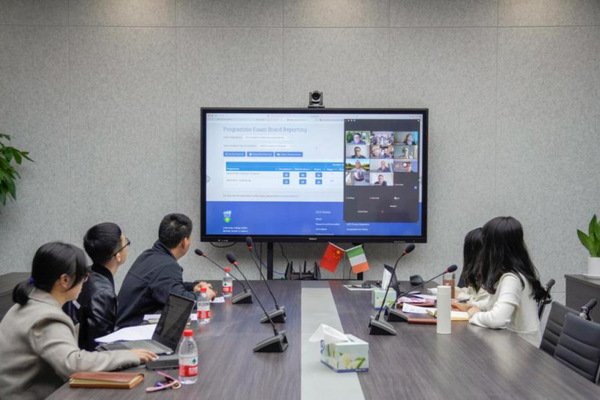On the afternoon of March 24, 2021, CDIC held the 2020 Autumn Semester Exam board meeting of Civil Engineering Infrastructure, Automotive Engineering, and Transport City Planning and Environmental Policy major in the meeting room on the fourth floor of the Hongyuan Building. Paul Fanning, Provost of the University College Dublin China, Bai Qiang, Deputy Dean of the CDIC, Jia Jieyu, Director of the Teaching and Academic Affairs Department, and the Deputy deans and core curriculum leaders of the two colleges attended the meeting.
First of all, Paul Fanning introduced the overall results of the three Sino-foreign cooperatively-run majors in the fall semester of 2020. The two sides expressed no objection to the overall results of the 2020 fall semester. Paul Fanning showed the participants the average score and score distribution of individual courses.
Alex Runchman, the head of the Language Center of the University College Dublin, evaluated the English course results. He said that the current assessment method for the English courses of the CDIC strictly adopts the whole process evaluation mode, so as to ensure that students can improve their English language ability from multiple perspectives and laid a solid foundation for the follow-up all-English study.
Afterwards, Paul Fanning showed online the GPA distribution trend of students majoring in Sino-foreign cooperative education in the Civil Engineering Infrastructure major in the University College Dublin score report system. He said that although some courses are taught online due to the pandemic, the distribution and trend of GPA showed a dynamic and benign development trend and the overall performance of students was good.
Finally, Paul Fanning signed and issued the transcript for the 2020 fall semester, and completed the review of all course scores.
CDIC, with the strong support of various colleges and teachers, has been running smoothly. Students’ performance has been steadily improved. CDIC will continue to strictly control the quality of all aspects of education and teaching, and cultivate students into excellent compound talents who adapt to international communication and cooperation.
